China's latest crackdown on lawyers is unprecedented, human rights monitors say
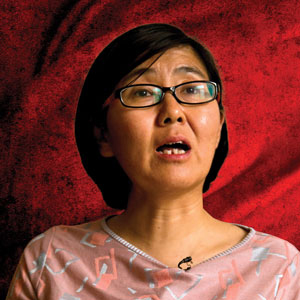
Wang Yu.
In retrospect, the media assault against Wang, one of China’s leading human rights lawyers, should have come as no surprise—and it fore-shadowed things to come.
Three weeks before the start of a large-scale government crackdown against the country’s increasingly restive community of human rights lawyers and other activists, China’s official news agency, Xinhua, issued a bizarre pair of articles. In one, the agency attacked Wang for having allegedly beaten a railway ticket collector until he became permanently deaf. In another, Xinhua declared that Wang’s credentials had been falsified, and that she had beaten up two people. Xinhua warned that Wang had to be “exposed” for what she was.
In the dead of the night on July 9, state security forces moved in. After she dropped off her son and husband at the airport, Wang returned to her Beijing home to discover the power and Internet cut off. In a social media post, she wrote that she “heard someone trying to force the doors open,” and that “calls to my husband’s and son’s cellphones are ringing unanswered.”
Both Wang and her husband, human rights attorney Bao Longjun, were detained July 9 and accused of inciting subversion of state power. In early January, they were formally arrested, their lawyer told the New York Times on Jan. 13. The pair have been incommunicado since July, when they began languishing under “residential surveillance”—a status sometimes interpreted to be the equivalent of house arrest but that is actually akin to a “black jail.” There, detainees are held in solitary confinement and subjected to extreme interrogation, forced confessions and even torture. Family members, friends and colleagues have been denied access or even knowledge of their whereabouts.
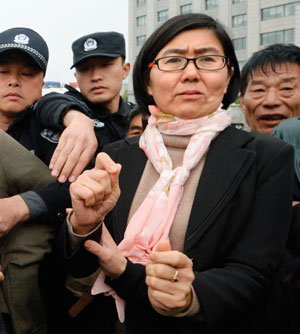
In April 2015, three months before she disappeared, human rights lawyer Wang protested against expropriations of farmland and properties in Suzhou, northwest of Shanghai. Photograph by AP Images/Kyodo.
The arrests of Wang and Bao are just the tip of the iceberg. By mid-November, more than 300 people had been swept up in what human rights monitors describe as an unprecedented crackdown on Chinese lawyers. Those detained or questioned include not only some of the most active rights lawyers but also their support staff, associates and even family members. At least three have seen their children’s passports confiscated and their movements curtailed; Wang and Bao’s 16-year-old son was stopped from flying to his boarding school in Australia and detained at his grandmother’s house after trying to sneak out of the country.
By early December, most of them had been released, but at least 41 still were detained or missing, according to the China Human Rights Lawyers Concern Group, which is based in Hong Kong.
After a one-day trial Dec. 14, a people’s court in Beijing convicted one of China’s most prominent rights lawyers of “inciting ethnic hatred” and “picking quarrels and provoking trouble” for comments posted online. Pu Zhiqiang’s three-year suspended sentence would allow him to go free as long as he does not commit another offense. But the conviction also means Pu will never be allowed to practice law again, according to reports by Western news outlets. Pu was detained in May 2014 and imprisoned for more than 18 months before being tried.
“It is positive that Pu Zhiqiang is unlikely to spend another night in jail, yet that cannot hide the gross injustice against him,” said William Nee, the China researcher at Amnesty International, in a statement. “He is no criminal, and this guilty verdict effectively shackles one of China’s bravest champions of human rights from practicing law.”
The arrests have been accompanied by what is possibly the biggest state media smear campaign in recent history. “Confessions” have been broadcast alongside TV programs highlighting alleged criminal activities of lawyers or their poor general behavior. (A video of Wang aired a week after her detention shows her “raising her voice and pointing at officials in court during a hearing,” Agence France-Presse reported.) Newspapers have disseminated the confessions as well and carried extensive denunciatory commentary.
Sharon Hom, the executive director of Human Rights in China and a law professor emerita at the City University of New York, says the action has no analogues in modern Chinese history.
“This mass crackdown on lawyers is the broadest in terms of location, and clearly coordinated because of the timing of the initial crackdown,” says Hom, who is based in the group’s New York City office. “It included more than 23 provinces. It was a combination of detentions, disappearances and targeting family members, together with a very clear propaganda smear campaign in the People’s Daily. This is clearly a mass attack on lawyers that’s misusing legal process, using propaganda and then bringing back the collective punishment of China’s past by targeting the families.”
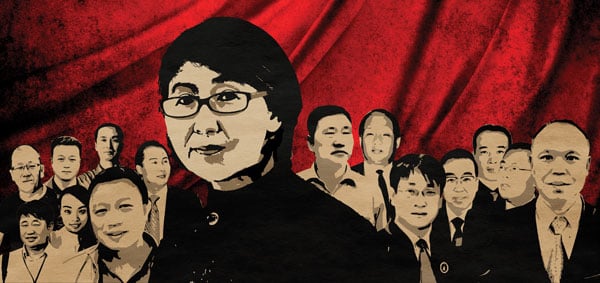
Illustration by Stephen Webster
THE ‘GREAT FIREWALL’ OF CHINA
The crackdown comes amid a changing human rights environment in China. A decade ago, there were a few dozen rights lawyers there. Today, there are hundreds. As their ranks have swelled, so too has their power to appeal to a wider audience. The greater reach has come not simply because of greater numbers, but because of the power of the Internet in China.
In spite of the “great firewall”—government efforts to limit access to sites considered subversive—Chinese citizens have access to more information and more varied sources than ever. Nearly 700 million people use the Internet today compared with about 150 million a decade ago. Microblogging services such as Weibo (212 million active users a month), messaging apps like WeChat (600M), and search and forum sites including Baidu (590M) have changed the landscape dramatically. “Netizens,” an engaged force of Internet users numbering in the hundreds of millions, move faster than the government—using the Web as a potent tool to fight corruption, petty crime and policy.
Lawyers and activists have tapped into this digital environment with great success. Online forums and messaging services have made large-scale organization possible while social media has allowed mass dissemination of narratives countering government propaganda. For a government intensely focused on controlling its narratives, the growing power of dissident groups on the Internet poses a grave threat.
In the government’s view, “this was an organized group of individuals who had grouped together to oppose government policy—the exact nightmare situation for the communist regime,” says Frances Eve, researcher for the Network of Chinese Human Rights Defenders, a coalition of international human rights NGOs headquartered in Washington, D.C.
“It’s something you always see when you look at civil society,” Eve says. “When an organization becomes too organized or a group of people becomes organized, that’s what scares them. An individual criticizing the government could be lost in the wave of information that is out there, but once you become more organized, that’s more of a threat.”
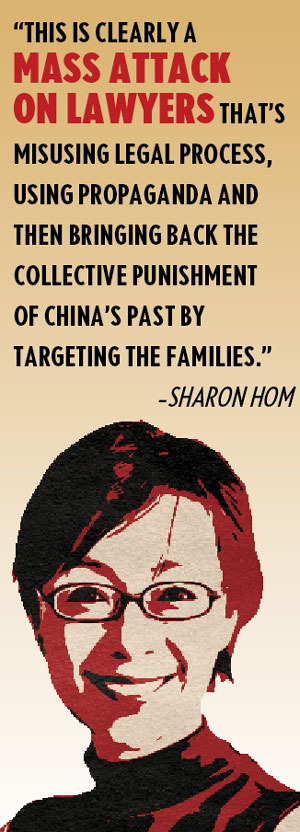
Illustration by Stephen Webster
Nee agrees that this organized presence made lawyers a hazard the government couldn’t leave unaddressed. “Many of the cases they take are related to holding the government accountable for human rights violations or human rights abuses, and many have a substantial following on social media. They have a degree of professional networking—solidarity among fellow lawyers who are aware of the cases—and the government sees this as a political threat,” Nee says.
One of the government’s primary targets has been the Fengrui law firm in Beijing; its director and numerous employees, including Wang, were picked up in the earliest days of the crackdown. Fengrui is a midsize, general practice firm that has taken on some of the biggest human rights cases of the past decade, including those of dissident artist Ai Weiwei and Ilham Tohti, an academic and advocate for the Muslim Uighur minority in the Xinjiang region who was sentenced to life in prison in September 2014 on charges of being a separatist. While those cases alone might have been enough to make the firm a target, it drew further government ire by taking great pains to publicize unjust cases. One of those arrested was an activist with the handle “Super Vulgar Butcher,” whom Fengrui employed to draw attention to cases.
“He would work with this law firm to do research and also … go outside the courtroom with a banner, with some signs, take photos of it and put it on the Internet,” Nee explains. “It would be retweeted massively and also retweeted on Weibo, and it would … shift the public narrative about some of these cases and bring attention to it domestically—put pressure on the judges, put pressure on the courts and also bring international attention to the cases.”
That attention has translated into severe criminal allegations. Fengrui was accused of “disrupting public order, seeking illegal profits, illegally hiring protesters and attempting to unfairly influence the courts,” stated reports in Xinhua. “Since July 2012, the group has allegedly organized more than 40 such controversial incidents.”
Days after his July detention, Fengrui head Zhou Shifeng reportedly confessed, saying in state media that he had knowingly broken the law. In such articles, Fengrui is invariably referred to as a “criminal gang.” The articles are part of a larger government effort to counter the work of the lawyers and regain the public narrative through a campaign of both information and erasure. Zhou was among several activists, including Wang and Bao, formally arrested last month.
On the censorship front, websites have been blocked and search results edited. Fei Chang Dao, a blog monitoring China’s Internet controls, recorded that after the detentions, Weibo blocked search results for “rights defense lawyers” while search engine giant Baidu refused to permit forums on the topic of rights lawyers. A few days later, Baidu expunged results so that a search for Wang would find only state media articles.
In October, state television aired footage of Wang and Bao denouncing their son’s attempted escape from China. In the videos, Bao weeps uncontrollably and an exhausted-looking Wang says she “strongly condemns” the actions as a plot by those with “ulterior motives.”
Eva Pils of King’s College in London has extensively researched Chinese law and the status of the country’s human rights lawyers. She says the media campaign was an integral part of the crackdown. “The intended impact is clearly intimidation,” Pils says. “I would call that visual repression—using images of persecuted lawyers to signal to the rest of society: ‘Make sure this is not you. You don’t want to end up in this place.’ Consider the effect these reports and broadcasts have on other members of the legal profession. You might be scared; you might think about exactly how much you would be prepared to use social media to discuss your case or reach out to colleagues,” she says.
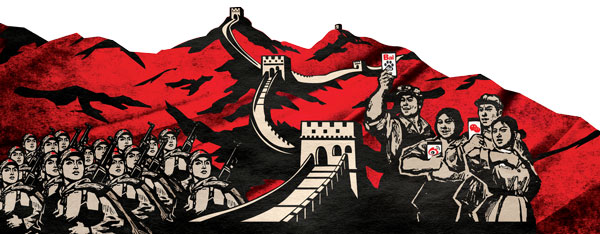
Illustration by Stephen Webster
UNEXPECTED RESULTS
Even while the rights community is reeling from the government actions, many say they are hopeful such intimidation will not work in the long run. “What happens when repression leads to resentment within wider circles of society?” Pils asks. “Even if it doesn’t lead to widely felt resentment or resistance, it might invite sympathy.”
One media smear campaign out of a historical playbook suggests that the government narrative is not selling well. Hom of Human Rights in China says, “Even though the online space is being controlled, regulated, monitored, what was interesting was that in the aftermath of that smear campaign, we saw posts … where it was not only family members who spoke out,” she says. In spite of the “ecosystem of intimidation,” a range of messages surfaced questioning the state’s account.
Former clients wrote messages denying the state media claims. “They said, ‘It’s not true that I was manipulated by my lawyer. My lawyer represented me,’ ” Hom says. “Individuals not connected in any way to the lawyers wrote things like this: ‘A criminal syndicate? Was there a trial? Have they been found guilty?’ There were also comments like: ‘Well, even if they were guilty in the end, shouldn’t they have legal representation?’ They’re not taking it silently, lying down.”
There is precedent for the Chinese government’s current campaign against human rights lawyers. In 2011, dozens of lawyers, activists and human rights workers were targeted. Many, such as prominent rights lawyer Teng Biao, were kidnapped, held incommunicado and tortured. (See “The Most Dangerous Job in Law,” ABA Journal, February 2015.) Then, as now, the government aimed to send a strong message to those considering “subversive” acts.
But the 2011 action also showed how “repression produces effects that are unintended from the perspective of those in charge,” Pils says. “There was a broad expectation that it would have a very, very bad chilling effect,” she says. “What happened was the movement grew. More and more lawyers were joining these groups, were holding meetings … and taking on cases together with more experienced human rights lawyers—even just joining signature campaigns or a social media group discussing a human rights issue was a meaningful first step that could lead to further involvement down the line. This is how the number of human rights lawyers grew from a few dozen or so five years ago to some 200-300 today. It’s too early to say what will happen from the effect of current repression.”
A POLICY OF TORTURE
For those who remain out of contact, meanwhile, detention is likely to include abuse and torture. In November, Amnesty International published No End in Sight: Torture and Forced Confessions in China, addressing the systematic use of the methods in the Chinese criminal justice system.
“Torture and other cruel, inhuman or degrading treatment or punishment … have long been prevalent in all situations where authorities deprive individuals of their liberty,” states the executive summary. “The Chinese government itself has acknowledged the extent of the problem and has increased attempts to address it.” Moreover, China in 1988 ratified the U.N. Convention Against Torture and Other Cruel, Inhuman or Degrading Treatment or Punishment, the report points out.
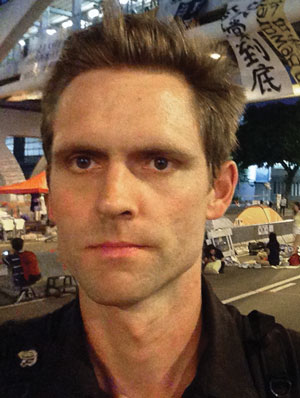
William Nee. Photo Courtesy of William Nee.
Nevertheless, the report states, the government “has failed to bring domestic legislation in line with the obligations of the treaty.” As a result, “extracting ‘confessions’ through torture is a serious human rights issue which the Chinese government needs to continue to address, by further bringing its domestic legal restrictions on prevention and prohibition of torture into line with international law and standards, in particular the Convention Against Torture, which binds China legally as a state party. In addition, other improvements in the legal system and improved implementation of these laws and standards are needed to effectively eradicate torture and other ill treatment.”
Amnesty International’s report relies heavily on interviews with lawyers who have experienced torture at the hands of government security agents. “I know from personal experience how widespread torture is in China’s current law-enforcement environment. I hope one day to see torture classified in China as a crime against humanity,” a lawyer named Yu Wensheng told researchers last summer. He described the 99 days in 2014 when he was accused of having aided democracy protesters in Hong Kong. His hands, bound behind an iron chair, caused “so much pain that I didn’t want to live.” A month after his interview, Yu was swept up in the current crackdown and imprisoned for 24 hours.
ATTENTION DROP
As the crackdown continues, rights activists have struggled to keep pressure on the government. In late October, German Chancellor Angela Merkel met with activists during a trade mission, but few other heads of state have followed her lead. When Xi Jinping, China’s president and general secretary of the Communist Party, visited the United Kingdom to discuss trade deals, Prime Minister David Cameron ducked any public discussion of China’s rights record. The U.S. government has been more outspoken on the issue, routinely voicing concerns over the arrests, but it has not sought to put strong pressure on China to change its policies.
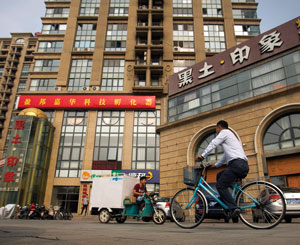
The Fengrui law firm in Beijing is a primary target of the Chinese government. Photograph by AP Photo/Mark Schiefelbein.
“The overall tendency has been one of weakening statements and pressure,” says Pils. “It’s a very difficult time for human rights in general: The rise of the surveillance state not just in China but the U.S. and Europe, the national security debate, leads to general weakening of human rights arguments.”
In an interview with the ABA Journal in October, Eve from the Network of Chinese Human Rights Defenders expressed concern that media attention had already “drifted away” from the plight of Chinese human rights lawyers. “There’s occasionally some statements from governments, but they’re still quite weak and they don’t take into account the scale of what this crackdown has entailed, the number of individuals who have been detained, the number of families who have been targeted, which is a really ugly form of collective punishment.”
Eve and other human rights advocates also expressed a desire to see the organized bar in the United States speak out more forcefully on the issue.
In August, the ABA issued a statement by then-President William Hubbard that “encourages the Chinese government to permit lawyers to discharge their professional duty to assure achievement of the fair and just legal system that the Communist Party has promised to all its citizens.” But the statement also emphasized that improvements to the rule of law in China can only be made through collaboration between the Chinese government and outside groups. Since 2004, the ABA has played an active role in those efforts through a number of initiatives being conducted in China through its Rule of Law Initiative.
“The development of a just rule of law is a continuing struggle in every nation, including the United States,” said Hubbard, who pointed out that the ABA highlighted at its annual meeting “the importance of supporting Chinese lawyers, maintaining progress on rule of law reform in China and continuing the ABA’s collaboration on that agenda.”
The ABA statement “urges the many foreign legal organizations, universities, NGOs and government agencies that have been cooperating with Chinese counterparts in advancing the rule of law to continue their collaboration, and encourages other foreign institutions that are objecting to the current treatment of lawyers in China to join in supporting those lawyers and cooperating with China.”
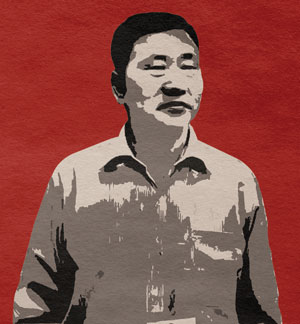
Fengrui law firm head Zhou Shifeng was formally arrested in January. Illustration by Stephen Webster.
In a Washington Post op-ed published Sept. 6, Robert Edward Precht, president of the legal think tank Justice Labs, said ABA members who pushed for a more critical statement “were met with strong opposition.”
“ABA members who are supporters of the Chinese lawyers were bitterly disappointed,” he wrote.
A few days later, the Post published a letter from ABA President Paulette Brown stating that the association “is concerned about recent legal developments in China and is following them closely, hoping that conditions will evolve to allow for ongoing international collaboration with Chinese lawyers, which has been mutually beneficial. The ABA is proud of its long-standing commitment to the rule of law and human rights,” she wrote. “There was a real obligation there for the ABA to speak out for our colleagues who are lawyers and who are targeted for being lawyers. I’m with the camp that is rather distressed about that,” says Hom. “Why does this require the international community to speak out? If you care about rule of law in China, this is clearly an attack on one of the strongest pillars in China to build a rule of law or respect rule of law.”
ORGANIZED IMPACT
Nee says the influence of organized bar groups should not be underestimated. “If lawyers and lawyers’ associations are able to forcefully and in a principled way speak out against what’s happening now, that will have a very important effect because it’s the opinion and professional advice of colleagues in the field,” he says. “In some ways that will have as much or more impact as governments speaking out.”
Brown discussed these issues directly with Chinese government officials during a trip in mid-November to address the Asia Forum, sponsored by the ABA Section of International Law. She described her activities in a letter prepared for release to members with questions.

Illustration by Stephen Webster
“Our approach has paired public statements of concern about the arrests and mistreatment of lawyers with private advocacy through third parties, particularly the U.S. government, and through direct dialogue with our Chinese counterparts,” Brown states in her letter. “In opening remarks at the Asia Forum, I underscored the importance of ‘the independence of the legal profession and the ability of lawyers to represent their clients without fear of reprisal,’ noting further that ‘around the world, this basic principle is too often disregarded,’ and ‘it’s imperative that we, as global lawyers, work together to promote the independence of the legal profession here in China and across the globe, so that all individuals will have equal access to the justice system.’ “
In addition to her speech at the forum, Brown reported, “I also raised our concerns and the importance of the independence of the legal profession in lengthy meetings with officials of the All China Lawyers Association, the China Law Society, the Supreme People’s Court and the National People’s Congress.” Brown also held meetings with the ABA’s Beijing-based Rule of Law Initiative staff, including U.S. and Chinese lawyers, “and with the lawyers and advocates with whom they partner in providing legal aid to migrants, training criminal defense lawyers to take advantage of new criminal procedure reforms, expanding protection for victims of domestic violence and the LGBT community, and improving environmental governance and protection.”

Wang Guanzhang. Illustration by Stephen Webster.
In sum, Brown states in her letter, “I believe that by continuing to support these reform leaders at the same time that we advocate for high-level bilateral U.S. government engagement on human rights issues and look for appropriate opportunities to directly raise our concerns with Chinese officials, we are most effective in upholding our principles and our commitment to promoting the rule of law abroad.”
A LETTER TO THE FAMILY
One of those in “residential surveillance” was Wang Quanzhang, a Fengrui lawyer who left a prescient letter to his family in the event of his arrest, which occurred in January.
“No matter how despicable and ridiculous we appear to be in the portrayal by the manipulated media, Mother, Father, please believe your son,” he wrote in a letter translated by Human Rights in China.
“My taking up the work—and walking down the path—of defending human rights wasn’t just a sudden impulse. Instead, it came from a hidden part of my nature, a calling that has intensified over the years—and has always been slowly reaching up like the ivy.
“This kind of path is doomed to be thorny, tortuous, rocky.
“But when I think of the difficult road we have gone through together, this path seems commonplace.
“Dear Father and Mother, please feel proud of me. Also, no matter how horrible the environment is, you must hang on and live, and wait for the day when the clouds will disperse and the sun will come out.
“Your son, I kowtow once more.
“(Please publish after I have lost my freedom.)”
This article originally appeared in the February 2016 issue of the ABA Journal with this headline: “China’s Human Rights Lawyers: China’s latest crackdown on lawyers is unprecedented, human rights monitors say.”
Abby Seiff is an American journalist based in Phnom Penh, Cambodia.




